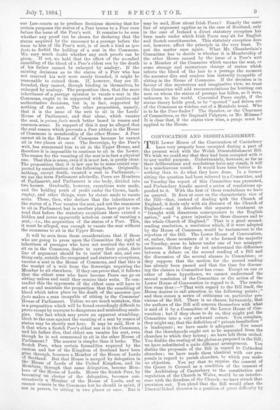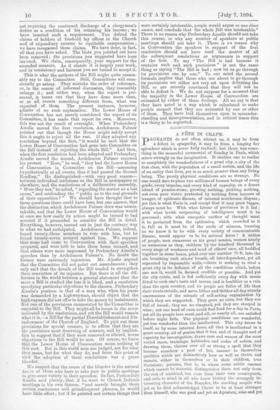CONVOCATION AND DISESTABLISHMENT. T HE Lower House of the Convocation of
Canterbury have very properly been occupied during a part of the present week with the Welsh Disestablishment Bill. We wish we could say that they had been occupied with it to any useful purpose. Unfortunately, however, so far as their deliberations and resolutions have any result, it will be a mischievous result. It would have been better to do nothing than to do what they have done. In a former sitting the question had been referred to a Committee, and on Tuesday the report of this Committee was presented, and Prebendary Ainslie moved a series of resolutions ap- pended to it. With the first of these resolutions we have no quarrel. It fixes at once on the characteristic vice of the Bill—that, instead of dealing vgith the Church of England, it deals only with six dioceses of the Church of England—and it describes this separate treatment as " fraught with disastrous consequences to the English nation," and "a grave injustice to these dioceses and to the whole Church of England." That is a good second- reading resolution, a resolution which, if it were adopted by the House of Commons, would be tantamount to the rejection of the Bill. The Lower House of Convocation, or, rather, those members of it who formed the majority on Tuesday, seem to labour under one of two misappre- hensions. Either they do not understand the difference between a debate on the second reading of a Bill and the discussion of the several clauses in Committee ; or they suppose that the motion for the second reading has already been passed and that the time for discuss- ing the clauses in Committee has come. Except on one or other of these hypotheses, we cannot understand the second resolution of the Committee or the action of the Lower House of Convocation in regard to it. The resolu- tion runs thus :—" That with regard to the Bill itself, the House desires to call attention to the following points ; " and then comes a series of criticisms on particular pro- visions of the Bill. There is no chance, fortunately, that the authors of the Bill will concern themselves with what is said of it by a Committee of the Lower House of Con- vocation ; but if they chose to do so, they might put the Committee into a very awkward corner. You complain, they might say, that the definition of " private benefaction " is inadequate ; we have made it adequate. You assert that the churchyards ought not to be separated from the churches to which they belong ; we have left them united. You dislike the vesting of the glebes as proposed in the Bill; we have substituted a quite different arrangement. You dislike the proposals of the Bill in regard to Cathedral churches ; we have made them identical with our pro- posals in regard to parish churches, to which you make no objection. You say that to require the consent of the Queen in Council as a condition of the consent of the Archbishop of Canterbury to the constitution and regulation of the Church in Wales, would be an interfer- ence with the freedom of the Church ; we have struck that provision out. You plead that the Bill would place the DisestaUished dioceses in a position of great difficulty by not requiring the continued discharge of a clergyman's duties as a condition of his retaining his income ; we have inserted such a requirement. You defend the claims of holders of freehold lay offices in the Church and of stipendiary curates to equitable compensation ; we have recognised these claims. We have done, in fact, all that you have asked. The blots you pointed out have been removed ; the provisions you suggested have been inserted. We claim, consequently, your support for the amended measure. As it stands it is largely your work, and in consistency and fairness you are bound to accept it.
This is what the authors of the Bill might quite reason- ably say to the Committee. Still, Committees will occa- sionally go astray. They mistake the order of reference, or, in the course of informal discussion, they insensibly enlarge it ; and either way, when the report is pre- sented, it turns out that they have done more than, or at all events something different from, what was expected of them. The present instance, however, admits of no such explanation. The Lower House of Convocation has not merely considered the report of its Committee, it has made that report its own. Moreover, this was not the result of oversight. When Prebendary Ainslie moved the first resolution, Archdeacon Palmer pointed out that though the House might safely accept this it ought to reject all the rest. If they adopted any resolution beyond the first, "it would be said that the Lower House of Convocation had gone into Committee on the Bill instead of rejecting the whole Bill." And then, when the first resolution had been adopted and Prebendary Ainslie moved the second, Archdeacon Palmer renewed his protest. "Here," he said," they had the Lower House of Convocation in Committee on the Bill—assuming hypothetically at all events, that it had passed the Second Reading." He distinguished—with very good reason— between individual criticisms on the Bill in newspapers or elsewhere, and the resolutions of a deliberative assembly. " Were they not," he asked, " regarding the matter as a lost cause," and misleading the " public as to the real grounds of their opposition ? " We should have thought that to these questions there could have been but one answer, that the distinction_which Archdeacon Palmer drew was unmis- takable, and that the Lower House of Convocation would at once see how easily its action might be turned to bad account if it proceeded to consider the Bill in detail. Everything, however, turned out in just the contrary way to what we had anticipated. Archdeacon Palmer, indeed, found twenty-three members to vote with him, but he found twenty-seven arrayed against him. We suppose that some had come to Convocation with their speeches prepared, and were loth to take them home unused, and that others were more impressed by Prebendary Ainslie's speeches than by Archdeacon Palmer's. No doubt the former were extremely ingenious. Mr. Ainslie argued that the Committee did not point out amendments ; they only said that the details of the Bill tended to strengthen their conviction of its injustice. But there is all the dif- ference in the world between a general statement that the more a Bill is studied the less it is liked, and a, resolution specifying particular objections to the clauses. Prebendary Ainslie's position is that of a man who, when his purse was demanded by a highwayman, should object that the highwayman did not offer to take the money by instalments. Not one of the provisions enumerated by the Committee is essential to the Bill. They might all be recast in the sense indicated by the resolutions, and yet the Bill would remain what it is,—a Bill for the partial Disestablishment and Dis- endowment of the Church of England. To pick out these provisions for special censure, is to affirm that they are the provisions most deserving of censure, and by implica- tion to suggest that if they were removed altered, worse objections to the Bill would be met. Of course, we know that the Lower House of Convocation mean nothing of this sort. But in this world men arejudged, not for what they mean, but for what they do, and from this point of view the adoption of these resolutions was a grave blunder.
We suspect that the cause of the blunder is the natural desire of those who have to take part in public meetings to give some variety to their speeches. In fact, Prebendary Ainslie said plainly, that if he went to Church Defence meetings in his own diocese, " and merely brought there certain resolutions and grandiloquent phrases, he would have little effect ; but if he pointed out certain things that were certainly intolerable, people would argue ex vino dine omrcee, and conclude that the whole Bill was intolerable." There is no reason why Prebendary Ainslie should not take this course, or why any number of speakers at public meetings should not take it. There is no reason why in Convocation the speakers in support of the first resolution should not have used the matter of all the subsequent resolutions as arguments in support of the first. To say " The Bill is bad because it contains such and such provisions " is not the same thing as saying " The Bill is bad ; now let us go through its provisions one by one." To our mind the second formula implies that those who are about to go through its provisions are either not very set upon defeating the Bill, or are secretly convinced that they will not be able to defeat it. We do not suppose for a moment that the majority in the Lower House of Convocation are animated by either of these feelings. All we say is that they have acted in a, way which is calculated to make people suspect that they are animated by one or other of them. They have laid themselves open to misunder- standing and misrepresentation, and in critical times this is a thing to be regretted.











































 Previous page
Previous page